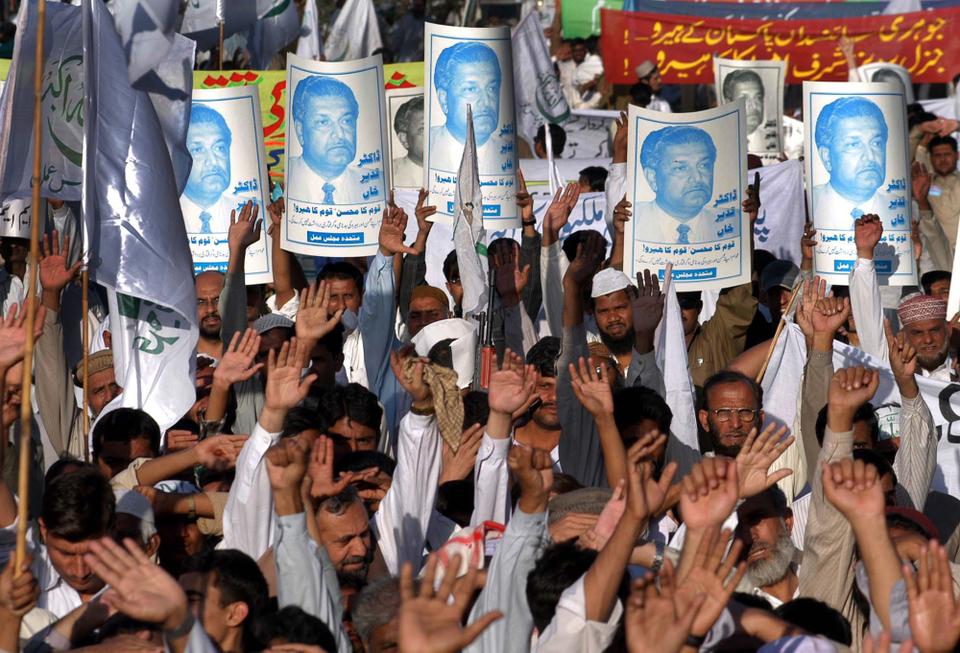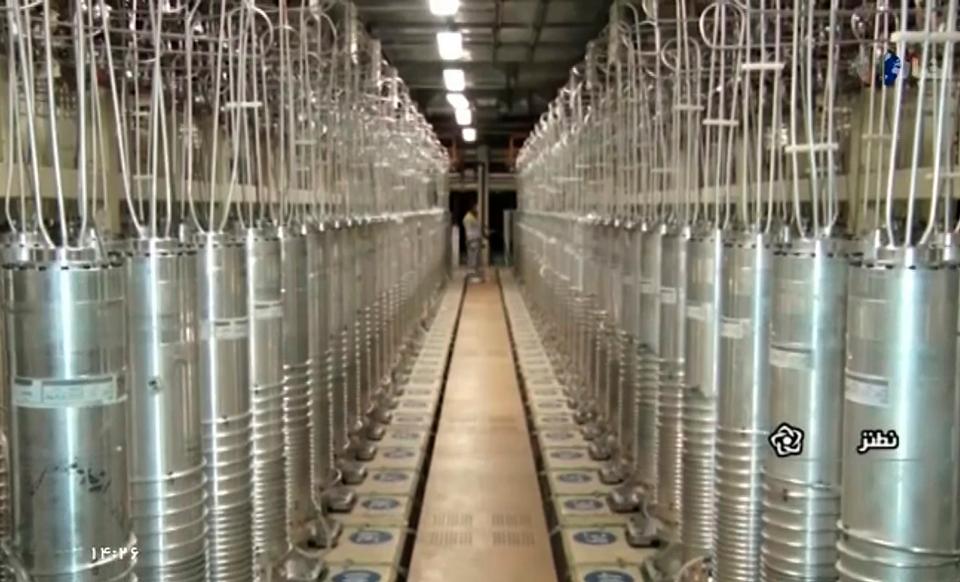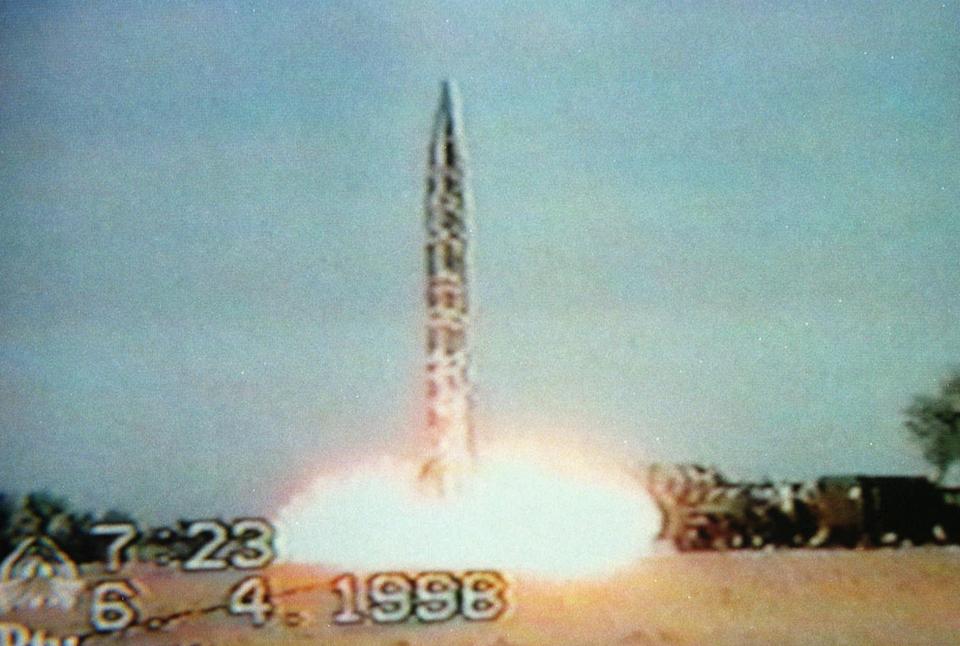He was a scientist, a tough taskmaster and the man who helped a developing Muslim country acquire the atomic bomb. He was also a proliferator of nuclear technology.
A day after Pakistan conducted nuclear tests on May 28, 1998, children in schools across the country sang and cheered during morning assemblies to the tune of the national anthem.
It was a moment of pride for an economically weak nation that grappled with harsh US sanctions and arms-control barriers.
Earlier that month, archrival India carried out a set of nuclear detonations. That Pakistan was able to respond quickly meant it had acquired the technology even as global powers tried to stop it.
Towns and cities were decked with Pakistani flags to celebrate the occasion.
Along with the pictures of then-Prime Minister Nawaz Sharif, one prominent figure being hailed for the successful tests was Dr Abdul Qadeer Khan, famously known as the father of Pakistan’s nuclear programme.
AQ Khan, as he’s popularly known, passed away on October 10 due to Covid-19 complications at the age of 85. Tens of thousands of mourners attended his funeral. Much to everyone's dismay, Prime Minister Imran Khan was not among them.
While in Pakistan he’s regarded as a hero, internationally he is seen as a peddler of nuclear technology to so-called rogue regimes.

AQ Khan sat on top of the world's largest known nuclear proliferation network that sold key bomb-making components to Iran, Libya and North Korea.
“AQ Khan is like Michael Jackson in some ways,” says Feroz Khan, a lecturer at the Naval Postgraduate School, Monterey, and author of the book, Eating Grass: The Making of the Pakistani Bomb.
“People remember Jackson as one of the best pop singers. But many would remember him as the person dangling a baby from the balcony."
“Just like that, AQ Khan dangled the Pakistani bomb,” he tells TRT World.
No bomb without AQ Khan
On February 4, 2004, Pakistanis and others around the world watched in shock as AQ Khan confessed on live television that he illegally supplied nuclear weapons technology to other countries.
That was a steep fall from grace moment for someone who was venerated as a saviour of Pakistan, the face of its nuclear programme.
AQ Khan played a crucial role in helping build gas centrifuges to enrich uranium, which becomes the fissile material for nuclear weapons.
But over the years efforts were made to diminish his role as the Pakistani state distanced itself from the scientist and his illicit activities.
“I have simply no doubt that there would not have been any bomb without AQ Khan,” says Hassan Abbas, a professor at National Defence University, Washington. He’s also the author of the book Pakistan’s Nuclear Bomb: A story of Defiance, Deterrence and Deviance.
“The Pakistani government, the army — they all tried to nullify his achievements. They wanted the world to know he was not a big deal.”
Involvement of one of the top officials responsible for the nuclear programme in proliferation activity would have inevitably raised the possibility of involvement of others at the highest level, Abbas tells TRT World .

Getting the blueprints
How AQ Khan was able to get hold of perhaps the most sophisticated technology of its time — design for modern centrifuges — is still the stuff of legend.
In the early 1970s, he was working in the Netherlands for a consultancy that did work on gas centrifuges for uranium enrichment.
As a metallurgist with a doctorate in copper metallurgy from Catholic University of Leuven, Belgium, his expertise brought him in close contact with those developing centrifuges in a plant in Almelo. That facility was run by URENCO Group, a nuclear fuel supplier.
Fluent in English, French and German, his managers would often ask him to translate German reports on centrifuge technologies. The importance of the sketches and details he saw didn’t miss his attention.
Months after India conducted its first nuclear test in August, 1974, AQ Khan reached out to the Pakistani government, offering his help in building high-speed centrifuges that can make weapons-grade highly enriched uranium (HEU).
The first letter he wrote to then-Pakistan Prime Minister Zulfiqar Ali Bhutto was not taken seriously. Pakistani officials thought he was a nutcase. But AQ Khan persisted and finally, in late 1974, met Bhutto in Pakistan.
Soon after, he moved to Pakistan along with his wife, kids and photocopies, designs and notes on critical centrifuge components.
When AQ Khan joined Pakistan’s nuclear programme, it was struggling.
Efforts to build nuclear reactors for both civilian and military use started in the mid 1950s when policies and institutions were created to train future scientists.
Among the pioneers were Dr Rafi Mohammad Chaudhry who built a high tension laboratory to carry out nuclear research, Nobel laureate in physics Abdus Salam, and Nazir Ahmed, first chairman of Pakistan Atomic Energy Commission, which was formed in the mid-1950s.

AQ Khan’s role was pivotal in helping build gas centrifuges to enrich uranium. That was no small feat. Pakistani scientists had for years tried using plutonium to make fissile material.
The plutonium route to a bomb was going nowhere. By the late 1970s, the scientists knew they would need high-speed centrifuges to make weapons grade HEU.
But having the design of a centrifuge was one thing. Getting hold of key components to construct it was another - and that’s where AQ Khan showed his real acumen.
Tapping into the grey market
The Treaty on the Non-proliferation of Nuclear Weapons (NPT) made it difficult for Islamabad to source material for its atomic programme.
Pakistan came under even more scrutiny after German television channel ZDF exposed AQ Khan’s theft of centrifuge designs in March 1979.
ZDF's reporting weaved together Islam, Middle East, A Q Khan and Israel’s security into an enticing conspiracy.
That’s when the catchphrase ‘Islamic Bomb’ became a media trope, writes Dr Malcolm Craig in his book America, Britain and Pakistan’s Nuclear Programme 1974-1980.
Despite being under the spotlight, AQ Khan established a complex network of front companies, financiers and middlemen to source key nuclear components such as ring magnets, vacuum pipes and inverters.
Pakistanis were always ahead of European enforcers. They’d book an order of dual use industrial goods and hide critical nuclear parts in the lengthy purchase order.
AQ Khan also tapped into his contacts such as the Dutch metallurgist Henk Selbos who for years supplied key components for Pakistan’s nuclear programme.
“The credit goes to AQ Khan that he knew which company would be able to sell key components and if those sellers would be able to overcome their domestic laws to make the shipments,” says Feroz Khan.
“Pakistan’s nuclear programme wouldn’t have gone anywhere without him.”
What was in it for him?
Why AQ Khan turned the same network, which he had used to help Pakistan’s nuclear programme, into a means for proliferation, is a matter of considerable debate.
Within Pakistan, AQ Khan had become a larger than life figure. He was untouchable — prime ministers and even military generals would hesitate to question where he traveled to and who he met. For years he had a Pakistan Air Force C-130 transport plane at his disposal.
AQ Khan was also boastful. He even started taking credit for things he hadn’t done such as designing the bomb.

Feroz Khan says AQ Khan and his associates earned “profound returns” from the proliferation network.
“All these individuals were in their retirement age and they were getting tremendous amounts of money. It was purely about business interest and nothing more.”
But Abbas points out that AQ Khan’s dealings with countries such as North Korea were not commercial transactions.
Pakistan’s medium-range ballistic missile Ghuari developed by AQ Khan’s team was a derivative of North Korea’s No-Dong missile.
Pyongyang had shared the missile technology in exchange of centrifuge components that AQ Khan provided.
“He wasn’t in it to accumulate wealth for himself,” says Abbas.
“It was partly a result of his intense feeling of defiance against the West and the fact that Muslim countries were not allowed to make a bomb. Obviously, if you want to do something in pursuance of these ambitions then you need a lot of money.”
Social media is bold.
Social media is young.
Social media raises questions.
Social media is not satisfied with an answer.
Social media looks at the big picture.
Social media is interested in every detail.
social media is curious.
Social media is free.
Social media is irreplaceable.
But never irrelevant.
Social media is you.
(With input from news agency language)
If you like this story, share it with a friend!
We are a non-profit organization. Help us financially to keep our journalism free from government and corporate pressure














0 Comments